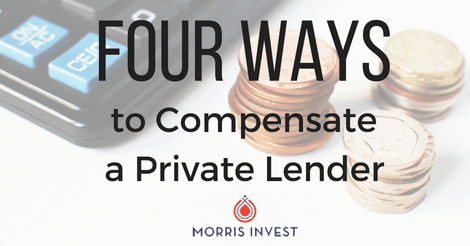
So you’re considering making a private note, but not sure what you can bring to the table? You’ll be glad to hear, there are no hard and fast rules! You can structure a private deal in any way you choose.
However, this is not a free-for-all. It has to be a win-win scenario for you and your private money partner. Just because there are no rules doesn’t mean you can make a selfish deal. Especially if this is your first private money deal, you’re going to have to make it appealing for the lender.
A private lender is out to get a high return. For them, that’s the whole point! If they’re not making money, they might as well stick their funds in a low-earning bank account or the stock market. Unless your lender happens to be your grandma, you’re going to want to offer a fantastic return. You want your lender to feel comfortable engaging in a deal with you. Also, if you compensate a lender well, they are going to want to work with you again and again! Private money starts with having a solid relationship based on trust.
But how can you determine what a fair rate is? Simple! Attend a local meeting and find out what the going rate is for private money in your market.
Here are four specific ways you can structure a private note to compensate a lender:
-
A profit split. Most new investors use this area of compensation. You might sometimes hear this referred to as a joint venture. Think of it as a trade. You’ve got extra time, and the private investor has extra money. You do the work; they fund the project. And when the project comes to an end, the investor gets half of the profits. This is the most expensive mode of compensation, but it can be a fantastic way to get started, gain experience, and establish trust.
-
Guaranteed interest. This is the most common way to structure a deal. Guaranteed interest works similarly to a typical traditional loan. The lender will expect you to supply a down payment, and then you will repay them the remainder of the loan, at an agreed-upon interest rate for a specified period of time.
-
Points. Points are fees that are equivalent to percentages of a loan. Think of points as an additional fee up front. For example, you might structure a deal borrowing $60k at 12% interest and one point. That would mean you would pay the one point at the beginning, and then the interest rate for the duration of the loan. If you’ve already established a working relationship with a private money lender, points are not recommended. However, if you feel you need to sweeten the pot, points can be a convincing way to persuade a lender who is on the fence.
-
Exit fees. An exit fee is when you pay the lender an additional fee at the end of the project. Typically, this is a percentage of the overall project price.
If you’re interested in learning more about private money, please subscribe to our YouTube channel! We’ve been working hard on our Private Money Series for you.
Ready To Build Passive Income Through Rental Real Estate?
Ready to talk about your goals? We're here to show you the tools and teach you the process to begin earning legacy wealth for you and your family.








